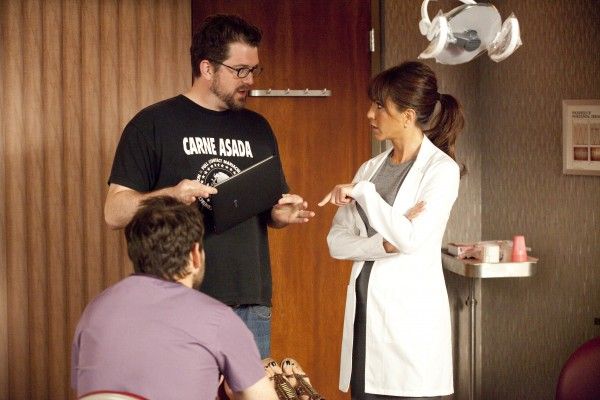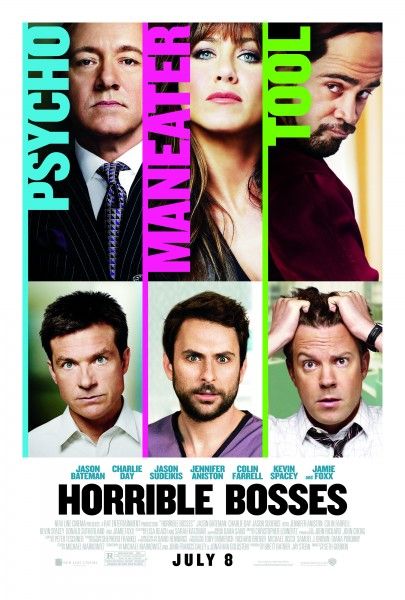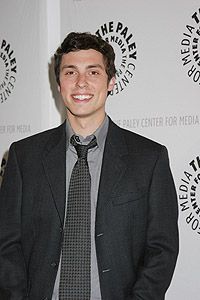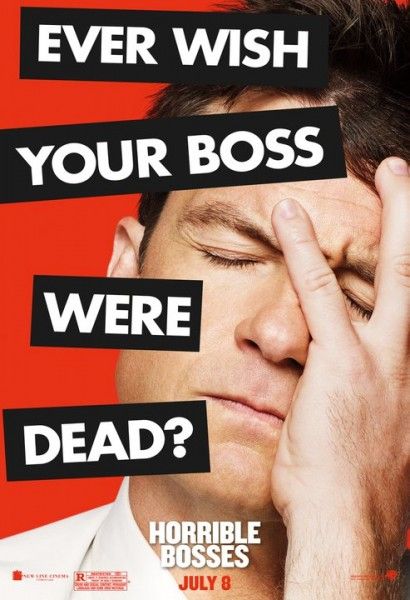Screenwriting partners John Francis Daley and Jonathan M. Goldstein may have come from very different backgrounds (Daley from being an actor and Goldstein from being a lawyer), but their shared sense of humor and ability to collaborate with ease is what’s brought them the success that they’re currently experiencing in Hollywood. Clearly on a roll, with the hilariously raunchy comedy Horrible Bosses out this week, and a long list of upcoming and in-development projects, they are clearly a writing team to keep an eye on.
In this exclusive interview with Collider, John Francis Daley (Dr. Sweets on the Fox series Bones and Sam Weir on cult favorite Freaks & Geeks) and Jonathan Goldstein talked about how they came onto Horrible Bosses, which had been in limbo since 2005, how having the same sense of humor strengthens their work, what it was like to see the incredible cast bring their words to life, and how impressed they were with the lengths the actors went to for comedy. They also talked about their desire to direct (they just did a Funny or Die short), what it’s like to collaborate with Steve Carell on two upcoming projects – Burt Wonderstone and Of All The Things, their desire to reboot the Vacation franchise, developing a project with Steven Spielberg (Cal of the Wild), and how they hope to continue to diversify their portfolio so that they’re not just known for one thing. Check out what they had to say after the jump:
Here’s the synopsis for Horrible Bosses:
Management candidate Nick (Jason Bateman) is doing everything he can to please his twisted supervisor Harken (Kevin Spacey) because he thinks it will earn him a well-deserved promotion. Dental assistant Dale (Charlie Day) has been fighting off the X-rated advances of Dr. Julia Harris (Jennifer Aniston), much to her dismay. And accountant Kurt (Jason Sudeikis) now has to answer to his company’s corrupt new owner, Pellit (Colin Farrell), who is on a fast-track to run the company into the ground. After some advice from a hustling ex-con by the name of Motherfucker Jones (Jamie Foxx), the guys come up with a plan, although ill-conceived, to permanently rid the world of their respective employers.
Question: How did you guys come to Horrible Bosses, since it was already in existence before you came to the project?
JOHN FRANCIS DALEY: It had been in existence for a long time. In 2005, Michael Markowitz, the original screenwriter, sold it to New Line and it had been tossed around with different directors and cast members for four years. And then, the success of The Hangover and R-rated comedy relaunched it. They had a roundtable with a bunch of writers, just to pitch ideas and jokes, and we had a previous relationship with New Line and they already liked us, so they decided to hire us to do the rewrite of it. That’s basically how it started for us.
Because you guys both come from different backgrounds, how did you become interested in screenwriting and what brought you to work together?
JONATHAN GOLDSTEIN: Well, I had been a lawyer in New York, prior to coming out to L.A. I had always known that the law wasn’t really my cup of tea, and I had a friend in law school who was writing some sample scripts, and I read them and thought, “Oh, this is how you get into this business.” They were television sitcom scripts. So, after two years at the firm, I quit, moved out to L.A. and started working in television. I did about 10 years on different sitcoms. And then, John and I met while we were both working on The Geena Davis Show – a sitcom – for about a season. He was an actor on it and I was a writer on it, and we found that we have a very similar sensibility and same sense of humor. So, some years later, in ‘07, we collaborated on a spec script, called The $40,000 Man, and that was bought by New Line, and that was the start of our screenwriting career.
DALEY: For me, I had always been interested in screenwriting, ever since I could write things down as a child. Obviously, I started as an actor, professionally, but screenwriting was always something that I had a great interest in. Finally, when Jonathan and I collaborated on The $40,000 Man, it was what set the wheels in motion for actually having a career at it.
John, when you decided to go down the screenwriting path and started having meetings with people, how did they react to knowing you as the kid from Freaks & Geeks?
DALEY: When we would go into pitch meetings, I would sometimes get recognized and they would say there were huge fans of the show. I don’t think it was necessarily a hurtle – the fact that I had a recognizable face – but it definitely was a topic of conversation before every pitch.
Do you feel that your acting has strengthen your writing?
DALEY: Absolutely, and vice versa. Once you see the entertainment world from both sides, you really get a greater understanding of how it all operates. As an actor going into screenwriting, I was able to understand what type of dialogue feels natural and what an actor could actually say. A lot of the time, as an actor, you don’t have the freedom to change what your lines are, and they can often be very unnatural or difficult to portray in a real light. That gave me a bit of an advantage.
How does your writing partnership work? Do you guys write together?
GOLDSTEIN: We pretty much are always working on the same page, at the same time, sharing a screen and sitting in the same room. That’s actually the most common scenario. Either we’ll be at my place or John’s. We work very closely on everything, whether it’s outlining or writing the actual script.
How would you define your sense of humor?
DALEY: We definitely have a very similar sense of humor. That’s part of the reason we decided to try writing together. We almost never really argue about what we think is funny.
GOLDSTEIN: In fact, when we see a comedy separately, we’ll know what the other person liked and didn’t like in the movie, without even talking about it.
Why do you think it’s so difficult for people to get respect at work from their bosses?
GOLDSTEIN: As I said, I worked as a lawyer before and I think it’s a combination of things. In some cases, like at a law firm, it’s almost like a fraternity house, where you’ve worked very hard to gain your status and you’ve taken your lumps, so you feel like now it’s your turn to dole out the lumps.
DALEY: Yeah, I feel like there is definitely a subconscious resentment that builds, as you work your way up the ladder. It’s the structure of how all of these jobs work. You have to take the crap from your higher-ups, and then by the time you, yourself, are the higher-up, you have all this pent-up resentment toward your bosses that you take out on your underlings. It’s not a healthy system.
GOLDSTEIN: In our movie, it’s a somewhat exaggerated version of that. These are people who, even out of the workplace, would be fairly dysfunctional and probably fall under several psychological disorders. Kevin Spacey’s character is a danger to society.
DALEY: He’s not a happy man, either.
What was it like to see this brought to life by the incredible cast that’s in this film? Were there lines or scenes in the film that you were most excited about seeing them do?
GOLDSTEIN: For example, with Kevin Spacey, when I pictured him doing that stuff with the drink, in the beginning, I couldn’t imagine it being done more effectively with so little. A guy like Spacey brings so much to the part, but does it with restraint, and that’s exactly how we imagined that being played. It’s much scarier when someone isn’t yelling at you.
DALEY: Also, the dynamic between the three guys was so refreshing to see on screen. After we had written these characters and their dialogue from only the perspective of our minds, and no one had been cast at that point, as we were writing it, so to actually see these three incredibly funny character players act out the scenes that we were laughing alone to ourselves about, in the writing room, it’s really exciting.
GOLDSTEIN: The fact that both Colin Farrell and Jennifer Aniston are playing parts very different from anything they had done before, and they were doing it so effectively, was really great to watch. John and I were also on set for much of the shooting of the movie, so sometimes we would tweak lines or jokes, if we felt like we could beat it or we could make it more specific to the actor.
DALEY: There was one instance where, when Charlie Day’s character drops the thing of cocaine, it only came out later that we should have them react to the side effects of all this cocaine billowing through the air. We wrote additional pages for when they’re trying to clean it up and they’re a bit hyper. You just find things within the context of the scene, as it’s playing out, that there’s always the possibilities for new bits.
GOLDSTEIN: To us, the fun of this movie was to put it in the voices of actual guys, who were maybe a little dumber than most people, but still real enough that you’d wonder, “What are they going to do next?”
Is it difficult to write a comedy where you know people will be going off the script and improvising lines that are different from what you’ve written, or do you find it exciting to see it take on its own life?
DALEY: When we first visited the set, when the three guys were doing one of their scenes, it was admittedly a bit scary, at first, to see how much they strayed from the page, in certain places.
GOLDSTEIN: I had to hold John back.
DALEY: Yeah, I was ready to punch someone out. But then, obviously, (director) Seth Gordon was very tactful with which takes worked and which ad-libs worked. It’s always better to have more to work with than less, and I think that all of the ad-libbing that they did really produced some incredibly funny moments that we didn’t even think about when we were writing.
GOLDSTEIN: Some of the big laughs actually are as we wrote them, but they brought an unexpected delivery to it. [Jason] Bateman, especially, has these hilarious pauses that he does, and really gets a great laugh out of small lines.
Because you have so many actors playing roles that people aren’t used to seeing them in, were any of them particularly surprising, as far as the lengths they would go to for comedy?
DALEY: Jennifer Aniston was completely unafraid to go there, as far as how raunchy and inappropriate her character, Julia, was. It was nice to see that, and understandable because she has been pegged as “America’s sweetheart” for so long. It’s nice to see her in a role where she actually is a bit demonic.
GOLDSTEIN: Same with Colin Farrell. He hasn’t done a lot of comedy, so when he put on that hair piece, he really just dove into it and had so much fun. There was nothing he wouldn’t do, I think.
John, are you looking to continue to balance acting roles with screenwriting? Does one take priority for you?
DALEY: They really don’t. I enjoy them both, in completely different ways. You have more creative freedom with writing, in certain ways, because you can create everything that happens. But, as an actor you also have creative freedom because you don’t so much focus on what has to move the story along, and only on how your character is reacting to situations. You’re using two different parts of your brain, and I really enjoy that. I just shot a movie in Vancouver, called Rapturepalooza, with Anna Kendrick, Craig Robinson and Rob Corddry, for Lionsgate, so I’m definitely trying to balance both aspects.
Had you thought about taking a bigger role in Horrible Bosses, or did you not feel you were suited to any of those characters?
DALEY: There was a minute there where they were talking about going younger with the three guys, but to be honest, I just don’t think it would have worked as much. It’s more difficult to be on board with some 20-year-old who’s having trouble with his boss because he hasn’t earned that resentment yet. He’s still young. I think it plays a lot better when you’re dealing with guys in their mid-30's who have dealt with it for 15 years. I don’t think there were any real roles in there that I would have been right for, so that’s why I took that tiny little cameo.
Jonathan, having done so much television work in your background, are you looking to continue to juggle TV and feature films?
GOLDSTEIN: I try to keep a foot in both camps, where I can. Most of my time right now is features, but I’m trying to do at least a pilot, each year, for a half-hour comedy. It’s a lot of fun, as a writer in television. You have a lot more control over the work than you do in film, which is much more of a director’s medium. I enjoy that ability to have a little more say in what goes on the screen. So, I think I’d like to continue to split my time. John is still on Bones, and I also have my day job.
Are either or both of you looking to direct as well?
GOLDSTEIN: Actually, yes, absolutely. Funny you should ask. We just directed a short film for Funny or Die that we wrote, and it has Will Forte in it, Erinn Hayes from Children’s Hospital and Joe Lo Truglio, who’s in a lot of funny movies. It’s just a five-minute thing that we did, but we wanted to have something to show some studios because we’d like to start throwing our hat in the ring to possibly direct some of the stuff we write.
DALEY: As a writer, you’re giving up your baby for adoption. But, if you can also direct, you’re giving up your baby for adoption to yourself.
GOLDSTEIN: It seems like a lot of bureaucratic paperwork, for no reason.
DALEY: Yeah, you might as well just keep the baby.
John, so many of the actors who have come from Freaks & Geeks have gone on to have great success writing and directing. What do you think it was about that show that cultivated so much up-and-coming talent?
DALEY: I think it was the talent of the casting director, Allison Jones, who either won or was nominated for an Emmy, purely for casting, and obviously Judd Apatow and Paul Feig, the show’s producers and creators. They were able to find such rare talent that didn’t have any real previous work. I would definitely credit them for being able to find such a great group of people.
What did you take away from your time on that show that you feel you’ve been able to carry with you, since then?
DALEY: It’s a great starting point, for any actor, to be on such a critically acclaimed show. Even if I hadn’t been on it, I would probably say it’s one of my top five favorite television shows of all time, just because it balanced comedy and tragedy so well and I think that resonated. Obviously not at first, when it was on NBC, but later on, but when it came out on DVD and established a cult status, there were all these fans, that were in the industry, that wanted it to continue and who are big fans of our work because of it. It definitely helps.
Being on another successful show now, how do you feel about the direction that Bones has gone in, both with the story and with your character? Are you looking forward to seeing how things play out, in the upcoming season?
DALEY: There’s been a huge shift in what the show will probably be, at this point, because now Emily [Deschanel] is pregnant and they’ve worked her pregnancy into the show. Bones has now been knocked up by Booth, David Boreanaz’s character, and obviously, that’s definitely going to change their chemistry. I’m very interested and excited to see how it will change the relationships between all the characters, including Dr. Sweets.
With so many projects in development, what is the next thing that you’re going to be focusing on for production?
GOLDSTEIN: The most likely is a movie called Burt Wonderstone, which is also a New Line project that’s set to star Steve Carell as a Vegas magician who has a fall from grace. Don Scardino has been hired to direct, and that is supposed to go into production in October, if all goes according to plan.
Don’t you also have another project with Steve Carell?
DALEY: Yeah, the other project that we have is called Of All The Things, and it’s based on a documentary with the same name, about a guy named Dennis Lambert, who was a huge music composer and producer, back in the ‘70s. He wrote “Baby Come Back,” “Nightshift” and “One Tin Soldier,” and all these songs that you’ve heard of. And then, he drifted into obscurity after he had released a solo album that he performed on and nobody bought it. No one liked it, except for in the Philippines, which unusually loved it and it was a huge success there. Cut to 30 years later, he’s now a real estate agent and he gets a call from this Filipino promoter, asking if he would be interested in going on tour in the Philippines, where he is thought of as this big celebrity. So, it’s a chance for him to live out this dream that he has been longing for, ever since the ‘70s.
What’s it like when you know you’re developing a project for Steve Carell? Is he very collaborative, as far as the development of the characters?
GOLDSTEIN: We had been working on Burt Wonderstone for a couple of years with various rewrites in different stages. When he came on, he really loved the script. There were certain things that he wanted to tweak, as any actor would want, but he is very collaborative and very involved, in a good way. Same thing with Of All The Things. We gave him the first draft and we’re writing the second draft now, based on his reading of the first. Obviously, it colors the way you go with the character.
What stage is the development of Vacation in and what made you want to revisit that?
DALEY: Right now, we are looking for an actor and a director, at this point. We’ve just finished a second draft of it. New Line seems to be very excited about it, and we jumped at the chance to work on it, when New Line presented it to us, because everyone from our generation, and generations before and after us, are big fans of the Vacation franchise, whether it just be the first film or the sequels. We wanted to preserve that fondness that people have for it, but also create a new thing for the reboot.
GOLDSTEIN: It has to be a movie that can stand on its own, if you aren’t overly familiar with the original, but also could pay homage to it, in some respect, so we tried to walk that line. It was a lot of fun to write. It’s a road movie, in the tradition of the originals. Tonally, it’s maybe a little more grounded and more Planes, Trains and Automobiles, we’d like to think. Right now, it’s one we’re excited about. Hopefully, that will be a project that will get going next year, most likely.
How did you get involved with developing a project (Cal of the Wild) with Steven Spielberg?
GOLDSTEIN: It was a surreal turn of events where we were meeting with Stacey Snider, the head of DreamWorks, and she had just started pitching us an idea that Steven had. I remember thinking, “Steven? Who is Steven?” And, as if on cue, the door to her office opened and Steven Spielberg walked in, and she introduced us and said, “I was just telling them about your idea,” and suddenly Spielberg was pitching us his idea. We just nodded a lot, went off and worked on it, came back and pitched them a version of it, and they hired us to write it. It was great. It was one of those meetings you come out of and you call everyone you know.
What is that film about?
DALEY: That’s about a Man vs. Wild type of survival expert who turns out to be a total fraud. He doesn’t really know how to survive in the wild, and he’s put into a real-life survival situation and doesn’t know what the hell to do.
You have a lot of really varied and interesting projects going on, for sure.
GOLDSTEIN: Yeah. One of the challenges is to diversify your portfolio, so that you don’t just do one thing. It would be easy to just do the hard-R comedies, but that becomes limiting. So, it’s fun for us to go the other way and do a PG or an animated feature.
DALEY: Or even something that has dramatic elements, like Of All The Things. It’s always a challenge to balance the comedy with the grounded, emotional stuff. That makes it a challenge for us, and a lot of fun.




